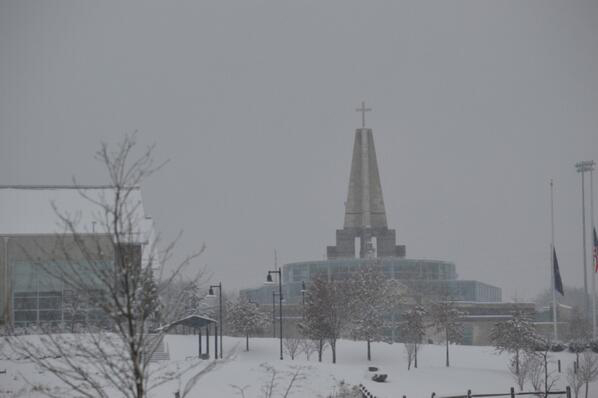John Flynn ’14: The Episcopal campus and surrounding area have been hit with unprecedented winter storms during the past three months. However, although these storms have delayed and closed schools for multiple days, the Episcopal maintenance crew has been able to clear the campus and make it safe for students and faculty despite massive snow accumulations.
Mark Notaro, director of facilities and operations, said, “Depending on the time of the storm, we will have people come in very early to try to open school on time.” For weeks after storms, maintenance workers still arrive around four in the morning to prepare the campus for the school day.
Notaro said that the maintenance crew has very flexible hours. For example, on February 12 he sent most of the crew home to get some sleep, because they were reporting to EA at midnight in preparation for the snow.

Photo Courtesy of T.J. Locke
One of the biggest problems for the staff with the massive amounts of snow is “just finding a place to put all the snow,” according to Notaro. In some places there are more than six feet of snow piled up and eventually crews need to transport it off campus. He also mentioned that this campus has many springs that have been rerouted. As a result, expansion joints on the sidewalks leak water for days after rain or snow, with that water freezing overnight. In response, maintenance crews constantly salt and treat the roads even without the threat of a new storm.
“There are some hard working men there,” said Joe Shanahan, Manager of Campus Safety. In terms of safety, Shanahan said a difficulty “is the kids who walk across the campus green, and the snow, and track that into the buildings, and we get slippery conditions inside the buildings. We have had a couple slips, a couple falls in the buildings.”
Notaro helps make the call for snow days and delays alongside Dr. Locke and others. He said that there are two important questions to ask before opening school. The first is whether the campus is safe. Even after the overwhelming number of snow days, Notaro said, “We would never sacrifice safety to open school and that is always the first priority.”
After safety comes practicality. They ask whether students and faculty can make it to school at all. “Obviously, if only fifty percent of the faculty can make it to school on time, it is not worth it to open school,” said Notaro.
For this reason they pay attention to other school districts and areas further away from EA. He said Philadelphia is a very important one, because many teachers live in and around the city. For students, Marple Newtown, TE, and Lower Merion are often good indicators. For instance on Thursday February 6, the Episcopal Campus was cleared, had power, and was safe, but almost all the surrounding area was without power and many roads were closed to due to down trees and power lines. So despite the safety of the campus, it would have been impractical to have school, because most students and faculty would not have been able to make it safely.
EA did, however, open campus for all those who needed power and hot water. Notaro noted that more than four hundred people made it to campus that day to take advantage of the facilities.
This winter has been one of the worst in recent memory, and Notaro says this is the worst he has seen since his second year working here, but the maintenance staff has been hard at work to keep the campus as safe as possible.
“It’s a constant challenge,” said Shanahan, “and its hard, hard work for the guys who are driving the plows and doing the shoveling. But they’re a dedicated group of guys, and it comes down to safety, clearing the school, getting it ready for a school day is our main goal. We’re an educational facility, [we want to] make sure that everyone can get in and out to where they can be safe.”